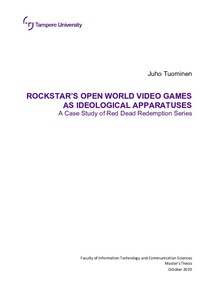Rockstar's Open World Video Games as Ideological Apparatuses: A Case Study of Red Dead Redemption
Tuominen, Juho (2020)
Tuominen, Juho
2020
Master's Programme in Game Studies
Informaatioteknologian ja viestinnän tiedekunta - Faculty of Information Technology and Communication Sciences
This publication is copyrighted. You may download, display and print it for Your own personal use. Commercial use is prohibited.
Hyväksymispäivämäärä
2020-11-13
Julkaisun pysyvä osoite on
https://urn.fi/URN:NBN:fi:tuni-202010197385
https://urn.fi/URN:NBN:fi:tuni-202010197385
Tiivistelmä
The topic of this thesis stems from a desire to better understand the political and ideological dimensions of virtual worlds. This is a particularly interesting subject, because the game industry itself tends to undermine political and ideological dimensions of the games they produce. However, a video game is a highly constructed cultural artifact and thus a video game should be considered as a powerful rhetorical tool, which make use of multiple rhetorical resources simultaneously, including audiovisual design, storytelling, character development, mechanics, gameplay and so on (Bogost, 2007). This thesis understands a video game as a playable representation and acknowledges that video games by their very nature are at the intersection of both system and representation.
The purpose of this study is to examine video games as ideological apparatuses. The goal of the thesis is to offer an insight on how to better understand the reality of virtual space as an ideological landscape. The goal is approached by utilizing Louis Althusser’s (2012) theory of ideological state apparatuses to open-world adventure video games. The usefulness of Althusser’s theory is demonstrated by closely analyzing the Rockstar Games’ representation of the West in Red Dead Redemption series.
The key argument of the study is that video games function as ideological apparatuses on two levels. First, they are a part of cultural ideological state apparatuses. Second, video games themselves render in front of us completely new worlds with their own ideological apparatuses. As a result of the study, a reader understands the nature of a video game as an ideological apparatus and can recognize the ideological and political underpinnings of a virtual reality rendered for them in a video game.
The purpose of this study is to examine video games as ideological apparatuses. The goal of the thesis is to offer an insight on how to better understand the reality of virtual space as an ideological landscape. The goal is approached by utilizing Louis Althusser’s (2012) theory of ideological state apparatuses to open-world adventure video games. The usefulness of Althusser’s theory is demonstrated by closely analyzing the Rockstar Games’ representation of the West in Red Dead Redemption series.
The key argument of the study is that video games function as ideological apparatuses on two levels. First, they are a part of cultural ideological state apparatuses. Second, video games themselves render in front of us completely new worlds with their own ideological apparatuses. As a result of the study, a reader understands the nature of a video game as an ideological apparatus and can recognize the ideological and political underpinnings of a virtual reality rendered for them in a video game.
